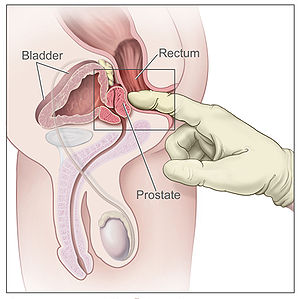#G374* - PROSTATE CANCER Seems Very Popular Amongst My Family & Friends!
 Image via Wikipedia
Image via Wikipedia
Hi,
I've had 2 friends die in the last 6 months with prostate cancer, I have several friends who have had radical prostectomies, and I know of several friends who are on 'watching briefs' - not least of whom is my cousin with a PSA that is far from welcome!
I was going to write about this a couple of weeks ago after a bit of a 'scare' I had with a bladder infection which presented rather similarly to my not infrequent bouts of bladder cancer, that have been an omni present threat since I first presented with symptoms of cancer 17-Nov-1998 & progressed to a radical open nephrectomy!
I was distracted from commenting on my recent check up as my Mother was taking those last faltering steps into the darknes and died at 01:30hrs. on Saturday last. I am so glad she is spared any further indignity as she has had advanced dimentia and has been unaware of anyone even herself for almost 3 years with the terror of knowing it is happening for several years before hand.
Well The Royal Gwent has a new bit of kit in their 'Flexi' clinic - a display screen so we get to watch the check up on screen.
I've watched a number of operations on screen it is strange to lie there on an operating table in gyne stirrps and chat to the team as they explain what they are doing on the screen as they cut chunks out of your bladder!
For those who have never had a flexi and by way of reassurance the 'Flexi' doesn't hurt, though it does feel decidedly od - kind of likle urinating when you were burst in to 'go' but the feeling is going backwards! There is no pain from the procedure and in fact I have had minor work done inside the bladder without anasthetic (electively) the benefit is that you can go home an hour or so after the operation!
There is virtually no risk in a 'Flexi' and contrary to popular belief neither 'Flexis' nor minor bladder cancer nor even a well performed nerve sparing radical prostectomy need cause any long term aftermath - I was amused by the notes given to people having had a 'Flexi' 'you may commence sexual activity as soon as you wish' most helpfully they at the end of the notes they provide the name and phone number of 3 specialist nursing sisters - may I assure readers they are specialists in urology and oncology!! I appreciate due to the utter incompetence of Aneurin Bevan in implementing The Beveridge Plan the NHS has become a political football and rather more of a way of buying votes by providing life style services rather than purely health services but I am glad to say that despite Labour's utter irresponsibility the service rarely provides sexual activities as a part of the service!
A popular misconseption is that these various medical problems cause either pain, incontinence or impotence - that is the stuff of the lurid imaginations of the ill informed or malicious!
The prostate itself is a strange organ split into 3 main nodes surrounding the urethra (the tube carrying urine from the bladder out of the body) the prostate is visible from the inside of men's bladders and tends to enlarge with age, this is perfectly normal and as it enlarges it raises the PSA (Prostate Specific Antogen) count in the blood - this is NOT a proof of cancer but it is an indication of progressive malfunction as is the Digital Rectal Examination.
I am in fact fortunate as I tend to have someone peering around inside my bladder as a result of my cancer so it is to be hoped that they will notice if there is a transition from merely 'notable' enlargement to possible cancer!
Aware of howmany men have problems with prostates in later life (60 onwards seems the norm) I decided to provide the outline infor below which comes from 'Dummies' and has a link to the original at the end. I hope it helps - and NEVER ignore symptoms, a failure to take changes and symptoms seriously has killed more of my friends than I wish to consider!
Prostate Cancer For Dummies
From Prostate Cancer For Dummies by Paul H. Lange, M.D., Christine Adamec
Screening and testing for prostate cancer are important for early detection and treatment. You can talk with your doctor about any concerns you may have, like prostate cancer treatment and side effects, finding a good specialist, and support from your partner, family and friends.Prostate Cancer: Essential Screening and Testing for Men
Prostate cancer is often curable, if the disease is diagnosed and treated early (before the cancer spreads). The following diagnostic tests should be done with your annual physical exam starting at age 50, or earlier if you have a history of prostate cancer in your family.- Digital rectal examination (or DRE): The doctor inserts his lubricated finger into your rectum to feel for lumps on the prostate, which is normally smooth. Nobody likes this test, but it can be a life saver.
- Prostate specific antigen (PSA) test: This blood test shows if you have elevated levels of PSA, which may indicate cancer is present.
- A biopsy: The doctor will remove tissue samples from your prostate to be checked for cancer. You can’t know if you have cancer until a biopsy is done.
- An ultrasound: This test uses sound waves to check for the presence of tumors. The doctor may use an external ultrasound in addition to the internal ultrasound (transrectal probe) used as part of the biopsy.
- A bone scan: Some doctors also perform a bone scan in addition to a biopsy, to check whether cancer may have spread to the bones.
Finding a Cancer Specialist and Asking Questions about Prostate Cancer
If your primary care doctor says you may have prostate cancer, he will want you to see a specialist, usually a urologist, to prescribe treatment and to answer your questions. When looking for a qualified specialist in your area, use these helpful tips:- Ask your doctor for a referral.
- Ask your dentist, your chiropractor, and others in the general health care field for recommendations of doctors.
- Check out information about physicians on the Internet.
- Talk to other people who’ve undergone treatment for prostate cancer, in your family and at work.
- "What treatments may be best for me and why?"
- "How much time can I take to decide on a treatment?"
- "Is nerve-sparing surgery an option for me, so that I can have a good chance of staying sexually potent?" (assuming surgery is recommended).
- "Should I have radioactive seeds implanted, external radiation treatments, or both?" (assuming radiation treatments are recommended)
- "Do I need to consult with other doctors? If so, what kind of doctors should I see and why?"
How to Deal with Side Effects of Prostate Cancer Treatment
The possible side effects of prostate cancer treatment cause most men to worry. The following information can help you talk to your doctor about overcoming and controlling the side effects that may accompany treatment for prostate cancer:- Impotence: If your doctor recommends prostatectomy surgery, ask him if nerve-sparing surgery, which can often preserve the ability to have erections, is an option for you. Also, if you do experience impotency after treatment, talk to your doctor about good solutions (such as Viagra, vacuum pumps, injections, and penile implants).
- Incontinence: Your doctor can prescribe drugs that will relieve you of the constant feeling that you have to go --- right now! You can also practice bladder exercises such as Kegels, which strengthen your bladder muscle. If the problem is severe, surgery to implant an artificial bladder sphincter can help resolve it. This should get you urinating normally again.
- Fatigue: If the problem is fatigue (and often, it is!) make sure you get at least seven hours of sleep a night. Also, a simple exercise regimen or regular walks can counteract tiredness. If fatigue stems from cancer-fighting drugs, ask your doctor about medications to combat your fatigue.
- Irritability, mood swings, and depression: Overcome emotional problems with therapy and support groups. Often your doctor can prescribe medications that can help.
Tips for Partners of People with Prostate Cancer
It may feel like the world is falling apart if your partner is diagnosed with prostate cancer. It is scary for both of you. Here are some tips for you to help your partner as he struggles with prostate cancer.- Be supportive. Let your partner know that you hate the cancer, too, and that you’re going to be there to help him fight it.
- Offer to go with your partner to see the doctor. If he is still upset over the diagnosis, he may miss half (or more) of what the doctor says. If you go to the doctor with him, you can take notes and ask a few questions.
- Realize that your partner will likely have at least a few weeks (if not months) before having to decide on a treatment. Take that time to help him gather information about treatments, support groups, and specialists.
- Convince your partner to take timeout from thinking about prostate cancer. Take in a football game or movie, walk in the park, or do other activities you enjoy together. Replenish your mental energies so that you’ll be better prepared to tackle the disease, treatment side effects, and long-term prognosis.
- Take some time out just for you — go to a movie or eat out with friends. Don’t devote all your time to thinking about resolving your partner’s prostate cancer problem. You’ll burn yourself out, and that won’t help him or you.
More Series
"In politics, stupidity is not a handicap." Napoleon Bonaparte (1769-1821),
Regards,
Greg L-W.
for all my contact details & Blogs: CLICK HERE
British Politicians with pens and treachery, in pursuit of their own agenda and greed, have done more damage to the liberty, freedoms, rights and democracy of the British peoples than any army in over 1,000 years.
The disastrous effects of British politicians selling Britain into the thrall of foreign rule by the EU for their own personal rewards has damaged the well-being of Britain more than the armies of Hitler and the Franco - German - Italian axis of 1939 - 1945.
Make your vote count vote:
INDEPENDENT Leave-the-EU Alliance
or Write on YOUR ballot Paper












No comments:
Post a Comment
You are welcome to comment but it WILL be moderated for abuse or bad language, libel, ad hominem attacks etc. & is unlikely to be posted if you lacks the integrity to comment using your identity/name.
Your opinion is valued, if you value it enough to use your own name and WILL be posted.